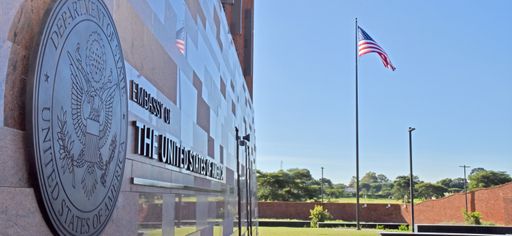Maziko Matemba, a community healthcare activist from Malawi's Blantyre, has visited the US seven times over the past decade.
Each of these visits has been for professional reasons. Not once has he overstayed his visa.
Under new US immigration rules, supposedly meant to clamp down on visa breaches by visitors from specific countries, Matemba's next journey could cost him an extra US $15,000 before he even boards the plane.
That's higher than the multi-year incomes of many citizens in this southern African nation with a population of over 21 million.
Outside Malawi's immigration headquarters in Blantyre, many passport applicants planning to travel to the US have been dealt a rude shock by what is being seen as weaponising visa bonds to make an already expensive proposition costlier still.
Unfair profiling
The US State Department has notified that the new rule, which kicks in on August 20, applies to citizens travelling on passports issued by Malawi or Zambia. The order states that whoever "is found otherwise eligible for a B1/B2 visa must post a bond in amounts of $5,000, $10,000 or $15,000, determined at the time of visa interview".
Frequent international travellers from Malawi and Zambia – and not just to the US – are aghast at the American authorities making a sweeping assumption about each visitor from their countries being a potential visa violator.
They feel it is condescending to be even unaware, much less acknowledge, that not every Malawian or Zambian visiting the US for work, holiday or to see family and friends intends to overstay.
Matemba points out that “$15,000 is a considerable amount even for the government to spend on someone visiting the US as the country's representative.” There are so many official visits requiring Malawian government representation, including the UN General Assembly.
The policy transforms what was once a $185 visa fee into an almost insurmountable financial barrier.
Economy return tickets from Blantyre's Chileka International Airport to New York's JFK Airport cost around $2,000 as of now, with similar prices from Kenneth Kaunda International Airport in Lusaka, Zambia.
Ban subterfuge
Analysts say that the policy amounts to a veritable visa ban disguised as a security measure.
The Council on American-Islamic Relations (CAIR) denounced the new measure as discriminatory, describing it as a form of exploitation and a "legalised shakedown".
"This is not about national security," says Robert McCaw, CAIR's government affairs director. "It's about weaponising immigration policy to extort vulnerable visitors, punish disfavoured countries, and turn America's welcome mat into a paywall."
The measure revives an initiative first introduced in November 2020, near the end of President Donald Trump's first term, but never implemented.
According to the US State Department notice, the country's consular officers worldwide have the discretion to determine bond amounts for travellers from countries with allegedly high rates of visa overstays.
"This targeted, common-sense measure reinforces the administration's commitment to US immigration law while deterring visa overstays," says State Department spokesperson Tammy Bruce.
The new bureaucratic requirements add another layer of complexity.
Visa holders who have posted a bond must arrive and depart the US via three specific ports of entry: Boston Logan Airport, JFK International Airport and Washington Dulles Airport.
Travellers who arrive or depart from anywhere else may be denied entry or have their departure not correctly registered.
The bond amount will be returned if travellers leave the US within the approved period and comply with all visa terms. Still, that "doesn't make it any better", says Matemba.
Blowback call
Some see in the US's high-handed approach a sliver of opportunity.
Anthony Mukwita, a former Zambian ambassador, has been quoted by Reuters as saying that rather than dwarfing dreams, the policy is a push to make Africa more attractive for its citizens.
"Zambia is a very resource-rich country," he says. "We have 750,000 sq km, with 90 per cent of that land being arable. We can till, we can weed, we can produce lots of food, we can reduce poverty, and Zambians will stay in Zambia instead of lining up for $15,000 visas."
With vast mineral reserves, scenic landscapes and beautiful cultures spread across the continent, Matemba agrees that it's time to show Africa is as much of a destination worth visiting as anywhere else in the world.
"This is a lesson to many African countries on how to project ourselves at a global level, and also to appreciate that countries can change," he tells TRT Afrika.

Plea for reason
Matemba hopes the Malawian and Zambian governments can persuade the US authorities to consider visa applicants on an "individual basis" rather than implement the new policy as a blanket measure against alleged visa overstays.
"Imposing those on everyone would be very unfair…Most go to the US for business or medical purposes and come back," he says. "The irony is that we are becoming more connected as a global village, yet these visa regimes are restricting the ability of people to share experiences, cultures, socio-economic benefits and even innovations."
Trump has taken a hardline approach to immigration since his return to office in January for a second term. He issued a travel ban in June that fully or partially blocks citizens of 19 nations from entering the US on national security grounds.
The notice posted on the federal register indicates that "data collected during the pilot may also be used to determine the effectiveness of visa bonds at reducing overstays, evaluate concerns about insufficient identity verification, and the extent to which visa bonds may deter otherwise legitimate B-1 and B-2 visa applicants from travelling to the United States".
Until that analysis is complete, travelling to the US would entail navigating multiple hurdles for professionals like Matemba – those who wouldn't give up home to overstay their welcome on foreign shores.



















